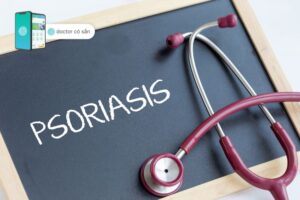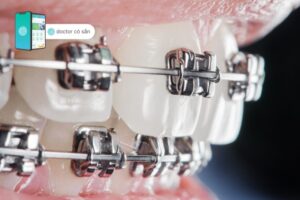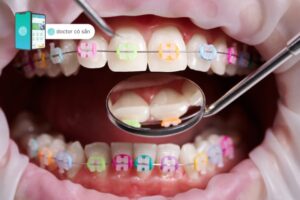Docosans Common STD Panel home test kit is a convenient, discreet and accurate way for many people to test for sexually transmitted diseases (STDs). Docosan launched its common STD panel in Ho Chi Minh City in 2021 and has since been building on the important networks and connections with healthcare partners across the city to ensure we were able to empower the people of Hanoi to get tested for STDs. Testing is a simple and important way that everyone can take to protect the health of their partners and take control of their own health.
This article guides you through the key things anyone needs to know about STDs from what’s included in Docosan Common STD Panel home test kit, why testing is so important to who you can talk to about any sexual health concerns. We even discuss why some people may be reluctant to learn about or get help with STDs.
Tóm tắt nội dung
- 1 Docosan’s home STD test is now in Hanoi!
- 2 Why is testing for STDs so important?
- 3 Contracting STDs
- 4 Effects of common STDs
- 5 Consequences of not testing for STDs
- 6 What is preventing people from getting tested for STDs in Vietnam
- 7 Key tips to prevent spreading STDs
- 8 Who to talk to about STDs in Hanoi
Docosan’s home STD test is now in Hanoi!
You can now purchase Docosan’s home STD test kit in Hanoi! We have partnered with local Hanoi service providers to allow you to:
- Order our common STD test kit with convenience and confidentiality from your mobile,
- Receive the discreetly packaged kit from 2 – 4 days,
- Test easily in your own home,
- Send samples to our partnered laboratory,
- Have your results sent back to you in an easy-to-read format and,
- Consult a licensed doctor for free if you wish to seek advice about your results.
The Common STD panel includes tests for:
- Human immunodeficiency virus (HIV)
- Syphilis
- Chlamydia
- Gonorrhea
Factors to consider when choosing to test at home or at a clinic:
- Convenience: Home kits allow people to take the test privately in the comfort of their own homes and at a time that is convenient for them
- Cost: Home tests are often more cost-effective than going to a clinic to test. This can be an important factor for people who are concerned about insurance coverage for these services
- Anonymity: You can keep your STD testing private and receive a home-test kit that is discreetly packaged with Docosan. A significant factor for people who may feel uncomfortable discussing their sexual health with a healthcare provider
- Accessibility: Not everyone may have access to a clinic nearby. Docosan’s home test affords people with the tools to self-test and has free access to professional advice.
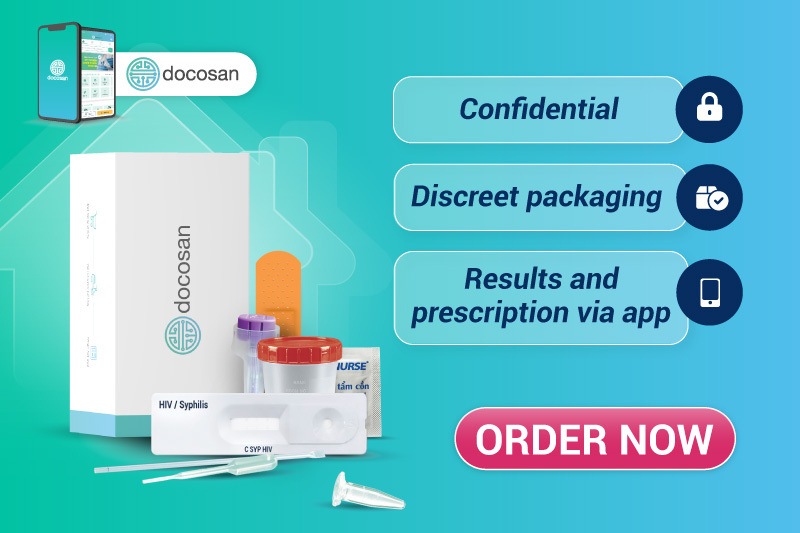
Why is testing for STDs so important?
STDs are infections that can be passed from one person to another through sexual contact. There are over 30 types of bacteria, viruses and parasites that can be passed between people through vaginal, anal and oral sex. A person can be infectious with an STD and not have any symptoms at all making STDs easy to spread without even knowing it. According to the World Health Organisation, over 1 million sexually transmitted diseases are transmitted every day, of which most are asymptomatic.
In Vietnam, some STDs are more common than others. For example, the most common STDs are HIV and Syphilis with HIV affecting about 0.4% of the adult population in Vietnam while other STDs such as Chlamydia and Gonorrhea are less common.

The HIV epidemic is largely due to the use of injectable drugs whereby many who inject drugs, live with HIV. Some population groups such as men who have sex with men and sex workers may have an increased risk of contracting STDs.
There is still a need to improve access to sexual healthcare and education about STDs in Vietnam. While efforts like community-based interventions, such as needle-syringe programs and peer education programs have helped increase access to information, organizations like Docosan are also working to make healthcare services and products such as the STD test more accessible. This enables individuals to make informed decisions about their sexual health and empowers people to take control of their own health and well-being when it comes to managing STDs.
It is very pertinent for people to protect themselves and their sexual partners by using physical barrier methods such as condoms and by testing regularly for STDs to prevent spreading them to others.
Contracting STDs
There are various ways STDs can be contracted or ‘caught’. Some of the ways include:
- Vaginal, anal, or oral sex. A common transmission method for HIV, Syphilis, Chlamydia, and Gonorrhea.
- Sharing of needles. A common transmission method for HIV, Hepatitis B and C.
- Blood transfusions. Some STDs such as Hepatitis B and C and HIV.
- Mother-to-child transmission. Some STDs like HIV and syphilis can be transmitted during pregnancy, parturition, or breastfeeding.
Effects of common STDs
STDs have a range of effects on the human body and they are largely dependent on the specific infection and the stage when it was diagnosed and treated. Potential effects of the common STDs include:
- HIV: The human immunodeficiency virus attacks the immune system, which makes it hard for the immune system to protect the body from infections and diseases. If left untreated, HIV can progress into Acquired Immunodeficiency Syndrome (AIDS), which is a serious and life-threatening condition.
- Syphilis: This is a bacterial infection that presents as sores on the genitals, anus, or mouth. If left untreated, it can lead to serious health issues such as brain damage, blindness, and severe organ damage. In 2016, it was estimated that close to 1 million pregnant women across the globe were infected with syphilis, eventuating in over 350,000 severe birth outcomes.
- Gonorrhea: This is another bacterial infection that can impact the throat, rectum, and genital tract. If left untreated, it can mean an increased risk of HIV transmission, pelvic inflammatory disease, and irreversible infertility.
- Chlamydia: This is also a bacterial infection that can affect the throat, rectum, and genital tract. However, if left untreated, it may lead to ectopic pregnancy (a pregnancy that occurs outside the uterus of females and can have serious consequences), infertility, and an increased risk of HIV transmission.
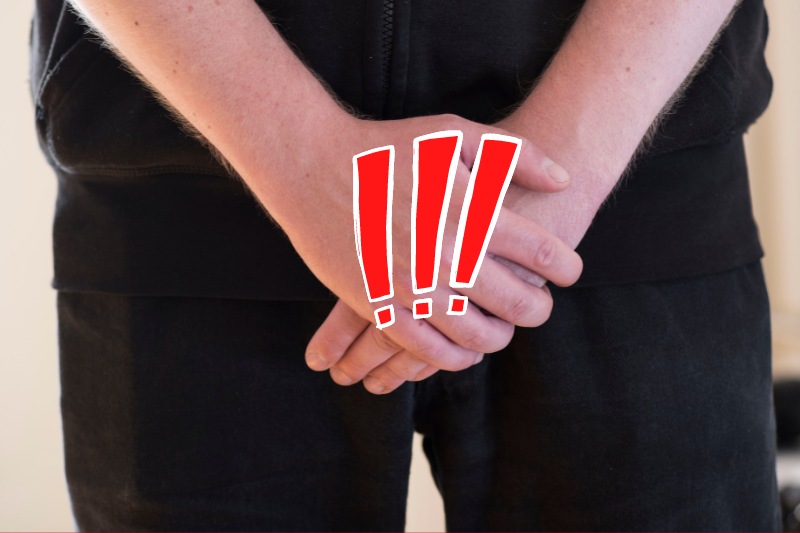
Consequences of not testing for STDs
It is common for a person to be infected with an STD and not experience any symptoms. This means that if a person does not test for STDs, they will not know that they have an infection. The unfortunate domino effect of not knowing is that a person may not receive treatment that is timely or effective and will have a 100% chance of unintentionally passing on the infection to someone else without knowing. It is important that people are aware of the risks of not testing for STDs and to get tested regularly if they are sexually active. Here are just some of the consequences of not testing for STDs:
- Spread of infection. Not testing for STDs and potentially being positive puts your partners at risk of infection and further transmission.
- Discrimination and Stigma. It is important not to put others at risk and to minimize opportunities for further spread. You also want to give yourself the opportunity to manage your health and seek help first as opposed to learning from another person about your potential exposure to STDs and facing stigma and discrimination.
- Risking the health of your sexual partners: By not testing for STDs you are not able to identify and treat infections before they can be transmitted to your partners.
- Long-term health complications. By not testing in a timely manner for STDs and therefore potentially receiving ineffective treatment or no treatment at all, you may be at risk of developing complications or long-term health issues. Examples include the development of AIDs from untreated HIV or brain damage and heart problems from untreated syphilis.
What is preventing people from getting tested for STDs in Vietnam
People may not get help with STDs for a range of reasons. And sometimes it is because people are not aware of when they should be testing. Here we break down some barriers that prevent people from getting help with STDs in Vietnam.
- Lack of awareness: Some people in Vietnam may not be aware of the importance of getting tested for STDs. Some may not understand how to protect themselves and their partners from sexually transmitted diseases. A general lack of awareness can make it difficult for people to access the tools and information they need to prevent and manage STDs.
- Stigma and discrimination: There may be a culture of stigmatization of STDs in Vietnam, and people with STDs may be discriminated against or experience social isolation. This can make it difficult for people to feel comfortable seeking the help and support they need.
- Limited access to healthcare: Access to healthcare in Vietnam can be limited, particularly in rural areas where there may be a shortage of clinics and specialty services, and limited access to digital technology and the internet. This can make it difficult for people in these areas to access the necessary healthcare services.
- Economic Barriers: Cost can be a barrier for some people in Vietnam who want to get tested for STDs or receive treatment. People may not always have the financial means to prioritize paying for a test or treatment. For example, whether someone has health insurance or not will influence their likelihood of seeking healthcare, and noting that not all people will have access to insurance that covers STD-related services.
- Legal barriers: There may be certain laws that may require people to have certain documentation or permissions in order to access healthcare services, which can be a barrier for some people to access services. This includes sexual healthcare services like STD testing and treatment.
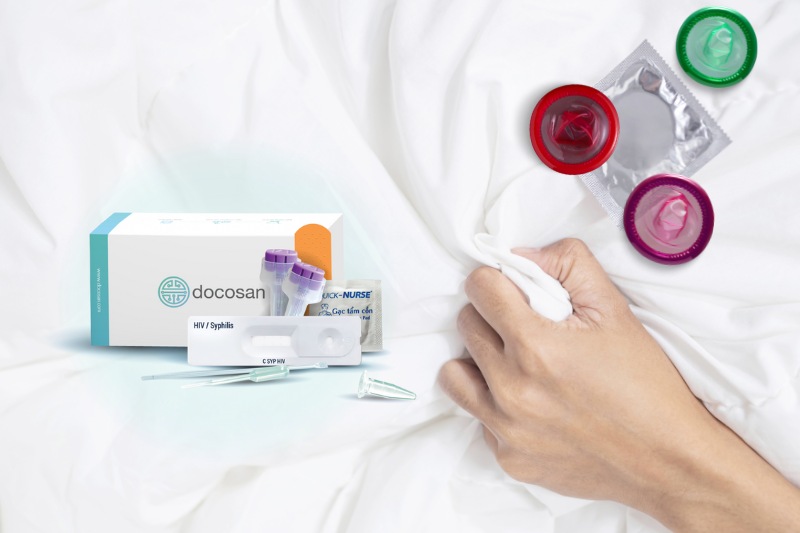
Key tips to prevent spreading STDs
- Use protection constantly and consistently: This includes every time you have oral, vaginal, or anal sex. Physical barriers like condoms are the most effective way to reduce your risk of getting an STD.
- Get tested regularly: If you are sexually active it is very important for you to test frequently especially if you have multiple partners. Some STDs have no symptoms and the only way to know is if you get tested!
- Take advantage of Docosan’s home STD test kit (Common STD panel): It’s convenient, discreet, accurate, fast, and cost-effective.
- Communicate with your partner: Get to know your sexual partner’s most intimate details. That is, what is their testing history and what is their current STD status to reduce your risk of infection
- Minimize drug and alcohol use: Substance abuse can impair your judgment and increase your likelihood of engaging in sexual behavior without considering the safety precautions to avoid the transmission of STDs.
- Get vaxxed! Some STDs, such as Hepatitis B and HPV (Human Papilloma Viruses), can be prevented with vaccines. Talk to your healthcare provider about which vaccines are recommended for you.
Who to talk to about STDs in Hanoi
Book an appointment with a gynecologist to get advice about your sexual health.
If you are concerned about your sexual health, it is important to talk to a healthcare provider.
There are a number of private obstetrics and gynecology clinics in Hanoi. There are also General Hospitals and clinics that have obstetricians and gynecologists that specialize in offering this specific service to patients. All gynecologists will be able to offer the help you may need. Here is a convenient list of places any English speaker may wish to consider visiting in Hanoi for further information about STDs and sexual health.
Dr. Marie (Marie Stopes) – Ba Dinh
Dr Marie Obstetrics and Gynecology Clinic is a network of over 10 health clinics specializing in women’s health across 9 provinces and cities in Vietnam. The network was established in 1994 and continues to operate at international standards. The 4 values that the network of clinics is built upon include accountability, courage, being customer-centric and always working towards their mission to empower women to take control of their health and lives.
They offer high-quality services at a reasonable price with some programs even being subsidized. Specializing in reproductive health care, family planning, and safe pregnancy termination options, they have a wide range of quality services to choose from.
Mediplus Medical Complex – Hoang Mai District
Mediplus Medical Complex is a general clinic that offers any patient a world-class experience from the moment you enter their doors. They are a modern and environmentally friendly clinic that focuses on creating positive medical experiences for all of its patients. They provide specialty services that include Ear Nose and Throat, Cardiology, Obstetrics and Gynecology. They make it very easy for anyone to book an appointment with them as they have many options of availability throughout weekdays.
Thu Cuc International General Hospital – Campus Hoang Mai and Cau Giay
Thu Cuc International hospital has been functioning as one of the top investment hospitals in the country and the top 3 hospitals in Hanoi for over a decade. They offer a wide range of specialty services from internal medicine and pediatrics to gynecology and obstetrics. They have two hospitals in Hanoi, one in the Hoang Mai district and one in the Cau Giay district. With many positive reviews for both, they continue to be a preference of choice for many in Hanoi. Depending on where you are in Hanoi, there is a hospital close by.
An Viet General Hospital – Thanh Xuan
An Viet is one of the top private hospitals in Ha Noi. They have a team of highly experienced Doctors and an internationally-qualified infrastructure to support the modern and world-class standard of service that they deliver.
The article is consulted by doctors and reliable domestic and foreign sources.






